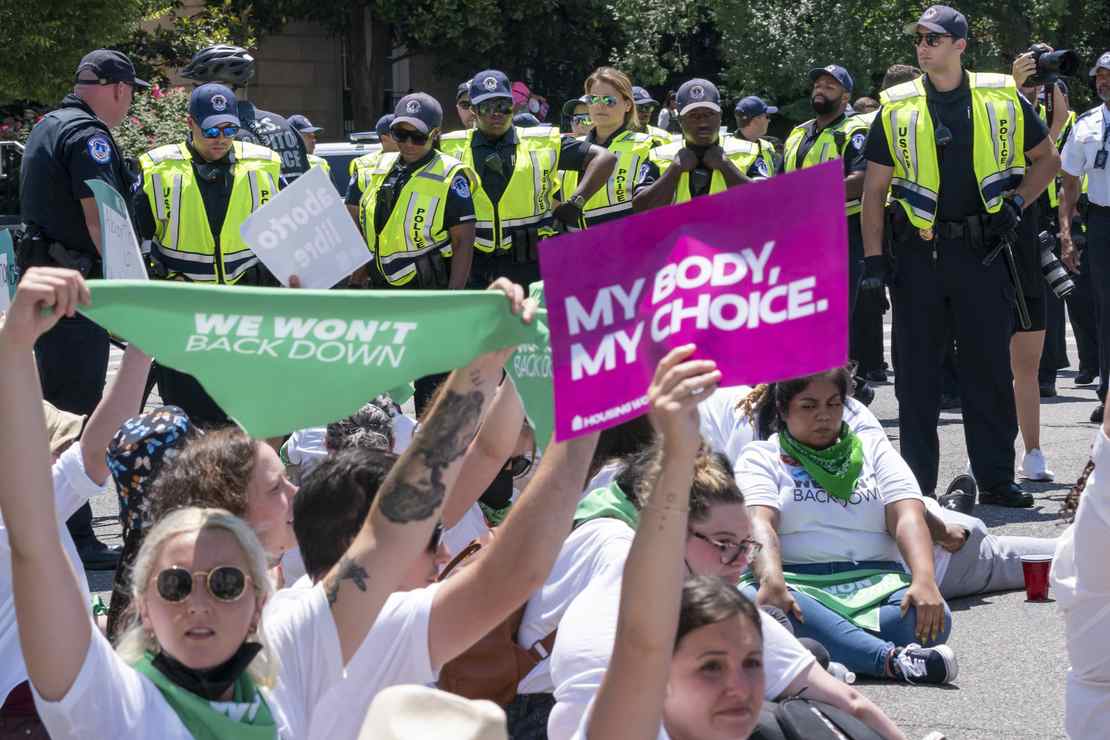
This is a logical first step as the two parties each feel their way towards the majority’s preferences. Dems are starting from the position of abortion on demand throughout all nine months, and they’ll have to come down from that eventually — but not just yet. Between the end of Roe and the quick scramble by red states to impose strict bans, the public attention’s is momentarily focused on Republican overreach. It’s the GOP that’ll have to make the first incremental move towards a national compromise, which will probably eventually settle on something like a ban after 12 weeks. And the logical first step towards that is to keep those new state bans in place while being more generous with exceptions than some pro-lifers are currently willing to be.
The long journey towards an abortion consensus which both sides can live with, however grudgingly, has begun.
In swing states and even conservative corners of the country, several Republicans have shifted their talk on abortion bans, newly emphasizing support for exceptions. Some have noticeably stopped discussing details at all. Pitched battles in Republican-dominated state legislatures have broken out now that the Supreme Court has made what has long been a theoretical argument a reality…
Republican consultants for Senate and House campaigns said Thursday that while they still believe inflation and the economy will drive voters to the G.O.P., candidates are going to have to talk about abortion to blunt Democratic attacks that the party’s position is extreme. They have started advising Republicans to endorse bans that allow exceptions for pregnancies from rape or incest or those that threaten the life of the mother. They have told candidates to emphasize care for women during and after their pregnancies.
I doubt that Republicans are worried about losing the House over abortion. Kansas’s referendum dealt squarely with the issue squarely whereas midterm votes are more of a “vibe” about the state of the country writ large. But after the pro-life position went down in flames in a Trump +15 state this week, GOP strategists are understandably wary of poking the bear. At Puck, Tara Palmeri reports on a “collective freakout” among that not very pro-life group:
This from @tarapalmeri pic.twitter.com/R8SOHZkIkB
— Molly Jong-Fast (@MollyJongFast) August 5, 2022
Remember, per one analysis, referendums like Kansas’s would likely pass in 43 out of 50 states. Abortion won’t decide the midterms, but inasmuch as fringy views on exceptions for rape and incest might galvanize some marginal voters on the left, it could flip individual races. Tudor Dixon, the GOP’s new nominee for governor in Michigan, is doing herself no favors in a 50/50 state with this position:
[embedded content]
READ RELATED: Tomorrow Is 'Victory Day' in Russia but Vladimir Putin Is Losing, So What Does He Offer Russia
Nate Cohn’s best guess based on demographic data is that a Kansas-style referendum would pass easily in Dixon’s state with 65 percent of the vote. She may have taken her uncompromising position on abortion because she was viewed as the establishment candidate in the primary and needed to show MAGA voters she’d be willing to fight hard on the ultimate culture-war dispute between the parties, but that was a dumb fight to pick given how Democrats will use it against her in the general.
For cripes sake, even ultra-MAGA Doug Mastriano has started to back away from the absolutist position, per the Times. Mastriano has said in the past that he believes life begins at conception and “I don’t give a way for exceptions,” but lately he’s begun to wash his hands of the subject. “You decide on exceptions. You decide on how early. And that’s in the hands of the people,” he told voters during a recent radio interview. “That’s a fact. That’s not a dodge.” He’s right, it is a fact: His home state of Pennsylvania is likely to hold its own referendum next year on whether the state constitution should be amended to clarify that it doesn’t protect a right to abortion. (Abortion in PA is already legal by statute through 24 weeks.) And that may end up helping him in November, as swing voters leery of his position on abortion can vote for him knowing that they, not he, will soon decide abortion policy.
But that’ll be a cold comfort for pro-lifers, who won’t want to see another defeat on a popular referendum in a key state on this subject. And it probably would be a defeat, as Cohn’s model has the pro-choice position drawing 64 percent support in PA.
GOP consultants who spoke to ABC framed the aftershocks of the Kansas result this way:
“This result does not mean pro-choice candidates are going to win in a rout this November. Other issues are still far more important, and candidates are a bundle of issues. The key for Republican candidates is to back away from a total ban and get in line with public opinion, including conservative opinion, that favors time limits and exceptions for the mother’s health,” said one GOP strategist…
“There’s no doubt overturning Roe has given Democrats some momentum,” said one GOP strategist working on midterm races. “It seems the front-line races this fall won’t be as far down as a lot of folks had hoped. I think realistically we’re back to where D+5 districts are the front-line battles this fall.”
That’s probably right. The wave is coming but it might not be high enough post-Roe to splash down in “reach” districts. The House will flip, but abortion might stave off a red tsunami.
Strategically, the coldly rational thing for Republicans to do now would be to move towards 15-week bans of the sort Ron DeSantis recently signed in Florida and then go on offense. “We’re the ones staking out the sensible middle ground,” they might say to voters. “Democrats are the radicals who want to allow abortions while the mother is in the delivery room.” But politics isn’t wholly (or often) rational. Shifting to a 15-week ban just weeks after Roe was overturned would leave staunch pro-lifers wondering what the point of the last 50 years was. Nearly all abortions happen within the first 15 weeks; virtually nothing will have changed from the pre-Roe status quo if the GOP settles on that compromise position. Pro-lifers want them to press their advantage by seeking total bans where they can.
Which is to say, many pro-lifers won’t be convinced that bans with few or no exceptions are political losers until they actually lose, just like many pro-choicers won’t believe that Americans don’t want abortion on demand until they start losing some referendums on 15-week bans. Democracy is the ongoing process of disabusing each voter of the illusion that he or she is part of a silent majority on every issue. So too here. Exit quotation via Peggy Noonan: “This is America working it out. Some states will be extreme in one direction, some in the other. It’s going to be ugly for a while. Sweet reason has seldom been a dominant characteristic of combatants in this fight. Too bad, because in the vast middle there’s a lot of it.”
Source:






